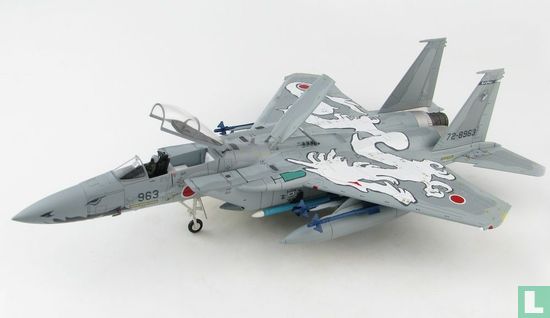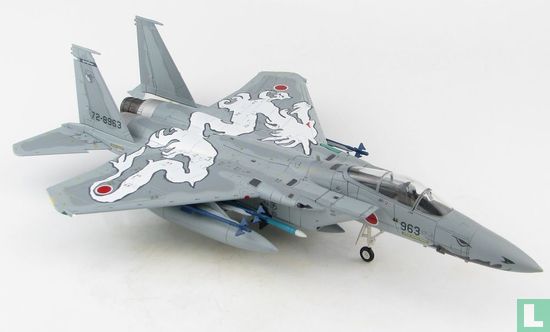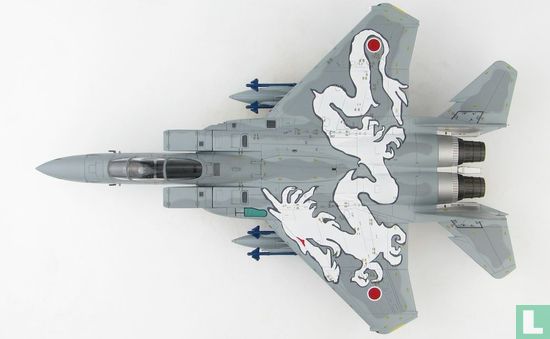


Enlarge image
JASDF - F-15J Eagle, 2003 TAC Meet White Dragon, 72-8963



Catalogue information
LastDodo number
8475837
Area
Aviation
Title
JASDF - F-15J Eagle, 2003 TAC Meet White Dragon, 72-8963
Airline
Aircraft type
Item
Manufacturer / brand of object
Material
Number
HA4521
Year
Collection / set
Theme
Country
Japan
Dimensions
Details
In 1967 the U.S. became aware of the Soviet MiG-25 Foxbat. This made it necessary to develop a new aircraft to counter the MiG-25. The USAF rejected the USN F-14 Tomcat and issued its own requirements. The solution came in the form of the McDonnell-Douglas (now Boeing) F-15 Eagle. The F-15A made its inaugural flight in July 1972 and in January 1976 the first Eagle entered service. The ""E"" entered service in 1989. The F-15 was the first dedicated USAF air superiority fighter since the F-86 Sabre. Presently Japan operates approximately 155 F-15J aircraft assigned to four wings consisting of seven operational squadrons. These wings are located at Chitose, Komatsu, Nyutabaru and Naha. Also the 23rd Training Squadron has five F-15s that act as aggressors. A JASDF annual TAC Meet (Tactical Air Combat) is held to hone the skills of air crews as well as ground and support crews. In 2003 the 303rd TFS’ (Fighting Dragon) entry was F-15J 72-8963 wearing a spectacular scheme of a White Dragon (Hakuryu) meant to strike fear into anyone who looked upon it. Specifications for the McDonnell Douglas (Boeing) F-15 Eagle F-15J is basically a ""C"" variant except for some electronics changes Role C – Single-seat, all-weather, air-superiority fighter - 483 built D – Dual-seat variant of the C – 92 built E – Dual-seat, all-weather, multi-role strike fighter - 237 built Dimensions Length - C/D/E 63 ft 9 in (19.43 m) Wingspan C/D – 42 ft 10 in (13.06 m) E – 42 ft 9.75 in (13.05 m) Height C/D – 18 ft 8 in (5.69 m) E – 63 ft 9 in (5.63 m) Weights Empty C/D - 28,600 lb (12793 kg) E – 31,700 lb (14,379 kg) Maximum Take-off
C/D – 68,000 lb (30,844 kg) E – 81,000 lb (36,741 kg) Engines C/D – 2 X P&W F100-PW turbofans with afterburners, each engine rated @ 25,000 thrust (11,250 kg) E/F – Prior to August 1991 - 2 X P&W F100-P-220 turbofans, each rated @ 14,670 ls st (65.26 kN) dry and 23,830 lb st (106.0 kN) with afterburners After August 1991 – 2 X P&W F100-PW-229 turbofans, each rated @ 17,800 lb st (79.18 kN) dry and 29,100 lb st (129.45 kN) with afterburners Range C/D Ferry - 3,450 miles (3,000 nm) with CFTs + 3 X external fuel tanks E Ferry – 3,570 miles (3,100 nm) with CFTs + drop tanks With Drop Tanks only – 2,765 miles (2,400 nm) Normal Combat Radius – 790 miles (685 nm) Maximum Combat Radius – 1,150 miles (1,000 nm) Speeds C/D – 1,875 mph (Mach 2.5 +) E Maximum Level Flight Clean @ High Altitude – 1,650 mph (2,655 km/h) Cruise @ Optimum Altitude – 570 mph (917 km/h) Ceiling C/D – 65,000 ft (19,697 m) E – 60,000 ft (18,290 m) Armament C 1 X M-61A1 20mm multi-barrel internal gun, 940 rounds of ammunition 4 X AIM-9L/M Sidewinders And 4 X AIM-7F/M Sparrow missiles
Or Missile Combination - AIM-9L/M, AIM-7-F/M and AIM-120 E 1 X M-61A1 20mm multi-barrel internal gun, 512 rounds of ammunition 4 X AIM-9L/M Sidewinder on the under-wing stations And 4 X AIM-7F/M Sparrow missiles conformal fuel tank Maximum 8 X AIM-120 AMRAAM missiles 12 X CBU-52 (6 with wing tanks) 12 X CBU-59 (6 with wing tanks) 12 X CBU-71 (6 with wing tanks) 12 X CBU-87 (6 with wing tanks) 12 X CBU-89 (6 with wing tanks) 20 X MK-20 (6 with wing tanks) Presently Japan operates approximately 155 F-15J aircraft assigned to four wings consisting of seven operational squadrons. These wings are located at Chitose, Komatsu, Nyutabaru and Naha. Also the 23rd Training Squadron has five F-15s that act as aggressors. A JASDF annual TAC Meet (Tactical Air Combat) is held to hone the skills of air crews as well as ground and support crews. In 2003 the 303rd TFS’ (Fighting Dragon) entry was F-15J 72-8963 wearing a spectacular scheme of a White Dragon (Hakuryu) meant to strike fear into anyone who looked upon it. "





